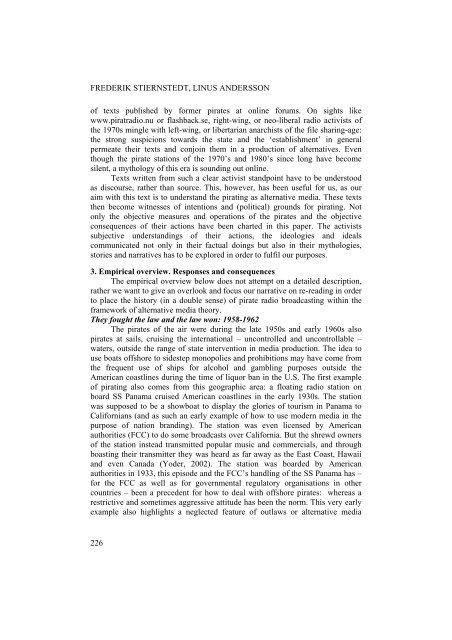culture, subculture and counterculture - Facultatea de Litere
culture, subculture and counterculture - Facultatea de Litere
culture, subculture and counterculture - Facultatea de Litere
You also want an ePaper? Increase the reach of your titles
YUMPU automatically turns print PDFs into web optimized ePapers that Google loves.
FREDERIK STIERNSTEDT, LINUS ANDERSSON<br />
of texts published by former pirates at online forums. On sights like<br />
www.piratradio.nu or flashback.se, right-wing, or neo-liberal radio activists of<br />
the 1970s mingle with left-wing, or libertarian anarchists of the file sharing-age:<br />
the strong suspicions towards the state <strong>and</strong> the ‘establishment’ in general<br />
permeate their texts <strong>and</strong> conjoin them in a production of alternatives. Even<br />
though the pirate stations of the 1970’s <strong>and</strong> 1980’s since long have become<br />
silent, a mythology of this era is sounding out online.<br />
Texts written from such a clear activist st<strong>and</strong>point have to be un<strong>de</strong>rstood<br />
as discourse, rather than source. This, however, has been useful for us, as our<br />
aim with this text is to un<strong>de</strong>rst<strong>and</strong> the pirating as alternative media. These texts<br />
then become witnesses of intentions <strong>and</strong> (political) grounds for pirating. Not<br />
only the objective measures <strong>and</strong> operations of the pirates <strong>and</strong> the objective<br />
consequences of their actions have been charted in this paper. The activists<br />
subjective un<strong>de</strong>rst<strong>and</strong>ings of their actions, the i<strong>de</strong>ologies <strong>and</strong> i<strong>de</strong>als<br />
communicated not only in their factual doings but also in their mythologies,<br />
stories <strong>and</strong> narratives has to be explored in or<strong>de</strong>r to fulfil our purposes.<br />
3. Empirical overview. Responses <strong>and</strong> consequences<br />
The empirical overview below does not attempt on a <strong>de</strong>tailed <strong>de</strong>scription,<br />
rather we want to give an overlook <strong>and</strong> focus our narrative on re-reading in or<strong>de</strong>r<br />
to place the history (in a double sense) of pirate radio broadcasting within the<br />
framework of alternative media theory.<br />
They fought the law <strong>and</strong> the law won: 1958-1962<br />
The pirates of the air were during the late 1950s <strong>and</strong> early 1960s also<br />
pirates at sails, cruising the international – uncontrolled <strong>and</strong> uncontrollable –<br />
waters, outsi<strong>de</strong> the range of state intervention in media production. The i<strong>de</strong>a to<br />
use boats offshore to si<strong>de</strong>step monopolies <strong>and</strong> prohibitions may have come from<br />
the frequent use of ships for alcohol <strong>and</strong> gambling purposes outsi<strong>de</strong> the<br />
American coastlines during the time of liquor ban in the U.S. The first example<br />
of pirating also comes from this geographic area: a floating radio station on<br />
board SS Panama cruised American coastlines in the early 1930s. The station<br />
was supposed to be a showboat to display the glories of tourism in Panama to<br />
Californians (<strong>and</strong> as such an early example of how to use mo<strong>de</strong>rn media in the<br />
purpose of nation br<strong>and</strong>ing). The station was even licensed by American<br />
authorities (FCC) to do some broadcasts over California. But the shrewd owners<br />
of the station instead transmitted popular music <strong>and</strong> commercials, <strong>and</strong> through<br />
boasting their transmitter they was heard as far away as the East Coast, Hawaii<br />
<strong>and</strong> even Canada (Yo<strong>de</strong>r, 2002). The station was boar<strong>de</strong>d by American<br />
authorities in 1933, this episo<strong>de</strong> <strong>and</strong> the FCC’s h<strong>and</strong>ling of the SS Panama has –<br />
for the FCC as well as for governmental regulatory organisations in other<br />
countries – been a prece<strong>de</strong>nt for how to <strong>de</strong>al with offshore pirates: whereas a<br />
restrictive <strong>and</strong> sometimes aggressive attitu<strong>de</strong> has been the norm. This very early<br />
example also highlights a neglected feature of outlaws or alternative media<br />
226












